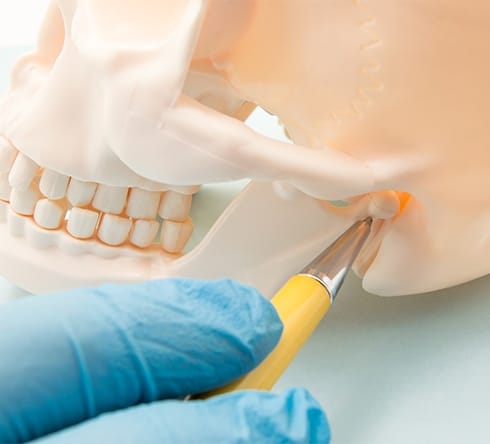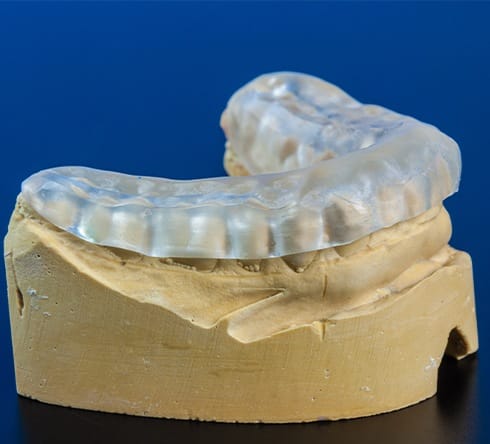
Get Started? Request an Appointment
Constant pain in the jaw, the area near your ear, or the muscles on either side of your face could point towards a problem with the temporomandibular joint, or TMJ. At first, these issues might not seem like a big deal, but over time the pain will grow worse, and you might not be able to move your jaw as easily. Dr. Marable has multiple options for helping you overcome your TMJ disorder; call us today for a consultation to discuss options for TMJ therpay in Fort Valley, GA.


A TMJ disorder, or TMD for short, is any condition that involves pain or dysfunction of the TMJ or the muscles around it. It should be noted that this is a very broad term; the condition can occur for multiple reasons, and in some cases it’s not even clear what is causing the symptoms in the first place. Generally speaking, TMDs are linked to orthopedic problems. This might include inflammation, sore muscles, or a strained tendon or ligament. There are cases where the disk of the joint has been displaced, affecting your ability to move your jaw properly.
Common risk factors of TMDs include:

The symptoms of a TMD are varied. You probably won’t experience them all at once, but if you notice any concerning signs on a regular basis, you should definitely consider the possibility that there might be a problem with your TMJ. Here are just a few issues to watch out for:
One common sign of a TMD is a clicking sound that occurs when you chew or move your jaw. There are cases where such a sound is actually nothing to worry about. You should take note, however, if the sound is accompanied by pain or any of the above symptoms.

A TMD most likely will not improve on its own. Generally speaking, you can expect the pain to grow more severe over time, and jaw movements will become even more limited. Furthermore, if you don’t have the condition properly diagnosed, then there’s a good chance you’re allowing the underlying cause of the disorder to go unaddressed as well, and that could lead to further consequences. For instance, if you’re grinding your teeth at night, chances are the enamel is wearing down at a significant rate.

If you suspect that you have a TMD, let us know right away; we can make arrangements for you to have the condition examined and properly diagnosed. Figuring out the underlying cause of the disorder – or at least the biggest contributing factors – is key here; there are many different forms of TMD, and the appropriate form of treatment is different for each patient. Once we’ve narrowed down the nature of your TMD, we can start developing a solution.

If your teeth don’t come together properly, your jaw might not be able to find a proper resting position even when your mouth is closed. An occlusal adjustment involves modifying the biting surfaces of your teeth so that the pressure of your bite is distributed well. This reduces the amount of stress your TMJ suffers. Occlusal adjustments typically involve the removal of natural enamel, but in some cases, we might need to “build up” teeth with dental restorations.

An oral splint is primarily used to stop your teeth from clenching and grinding against each other. The protection that these oral appliances provide is twofold. Not only do they stop the teeth from making direct contact with each other, but they relieve some of the tension in your jaw muscles. Most of the time, you’ll wear your splints at night since that is when most grinding and clenching occurs. (You may need to wear one during the day in some cases, however.)

In addition to the treatments that Dr. Marable provides, you can often find relief from your TMD by changing certain habits. Depending on what is found during the diagnostic stage, we might recommend taking some of the following steps:
